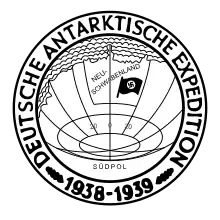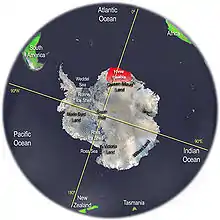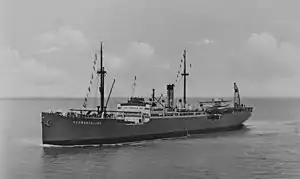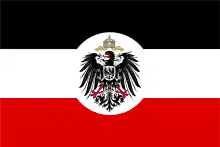New Swabia
New Swabia (Norwegian and German: Neuschwabenland) was a disputed Antarctic claim by Nazi Germany within the Norwegian territorial claim of Queen Maud Land and is now a cartographic name sometimes given to an area of Antarctica between 20°E and 10°W in Queen Maud Land. New Swabia was explored by Germany in early 1939 and named after that expedition's ship, Schwabenland, itself named after the German region of Swabia.[1][2]
| New Swabia Neuschwabenland | |
|---|---|
| Disputed Antarctic claim of Nazi Germany | |
| 1939–1945 | |
 Expedition logo
(1938–39) | |
 Territory comprising New Swabia marked in red | |
| Historical era | World War II |
• Contact reached | 19 January 1939 |
| 9 April 1940 | |
• Surrender of Germany | 8 May 1945 |
Background
Like many other countries, Germany sent expeditions to the Antarctic region in the late 19th and early 20th centuries, most of which were scientific. The late 19th century expeditions to the Southern Ocean, South Georgia, the Kerguelen Islands, and the Crozet Islands were astronomical, meteorological, and hydrological, mostly in close collaboration with scientific teams from other countries. As the 19th century ended Germany began to focus on Antarctica.
The first German expedition to Antarctica was the Gauss expedition from 1901 to 1903. Led by Arctic veteran and geology professor Erich von Drygalski, this was the first expedition to use a hot-air balloon in Antarctica. It also found and named Kaiser Wilhelm II Land. The second German Antarctic expedition (1911–1912) was led by Wilhelm Filchner with a goal of crossing Antarctica to learn if it was one piece of land. As happened with other such early attempts, the crossing failed before it even began. The expedition discovered and named the Luitpold Coast and the Filchner Ice Shelf. A German whaling fleet was put to sea in 1937 and, upon its successful return in early 1938, plans for a third German Antarctic expedition were drawn up.
German Antarctic Expedition (1938–1939)
The third German Antarctic Expedition (1938–1939) was led by Alfred Ritscher (1879–1963), a captain in the German Navy. The main purpose was to find an area in Antarctica for a German whaling station, as a way to increase Germany's production of fat. Whale oil was then the most important raw material for the production of margarine and soap in Germany and the country was the second largest purchaser of Norwegian whale oil, importing some 200,000 metric tonnes annually. Besides the disadvantage of being dependent on imports, it was thought that Germany would soon be at war, which was considered to put too much strain on Germany's foreign currency reserves. Another goal was to scout possible locations for a German naval base.[3]

On 17 December 1938, the New Swabia Expedition left Hamburg for Antarctica aboard MS Schwabenland (a freighter built in 1925 and renamed in 1934 after the Swabia region in southern Germany) which could also carry and catapult aircraft. The secret[3] expedition had 33 members plus Schwabenland's crew of 24. On 19 January 1939 the ship arrived at the Princess Martha Coast, in an area which had lately been claimed by Norway as Queen Maud Land, and began charting the region. Nazi German flags were placed on the sea ice along the coast. Naming the area Neu-Schwabenland after the ship, the expedition established a temporary base and in the following weeks teams walked along the coast recording claim reservations on hills and other significant landmarks. Seven photographic survey flights were made by the ship's two Dornier Wal seaplanes named Passat and Boreas.[1][4] About a dozen 1.2-meter (3.9 ft)-long aluminum arrows, with 30-centimeter (12 in) steel cones and three upper stabilizer wings embossed with swastikas, were airdropped onto the ice at turning points of the flight polygons (these arrows had been tested on the Pasterze glacier in Austria before the expedition).[1][4][5] None of these have ever been recovered. Eight more flights were made to areas of keen interest and on these trips, some of the photos were taken with colour film. Altogether they flew over hundreds of thousands of square kilometers and took more than 16,000 aerial photographs, some of which were published after the war by Ritscher. The ice-free Schirmacher Oasis, which now hosts the Maitri and Novolazarevskaya research stations, was spotted from the air by Richardheinrich Schirmacher (who named it after himself) shortly before the Schwabenland left the Antarctic coast on 6 February 1939.

On its return trip to Germany the expedition made oceanographic studies near Bouvet Island and Fernando de Noronha, arriving back in Hamburg on 11 April 1939. Meanwhile, the Norwegian government had learned about the expedition through reports from whalers along the coast of Queen Maud Land. Although some, notably Norwegian writer Bjarne Aagaard and German geographer Ernst Herrmann, have claimed that Germany never actually occupied the territory, it is well documented that Germany issued a decree about the establishment of a German Antarctic Sector called New Swabia after the expedition's return in August 1939.[2]
Any German claims to the region were abandoned in 1945.
Geographic features mapped by the expedition
Because the area was first explored by a German expedition, the name Neuschwabenland (New Swabia) is still used for the region on some maps, as are many of the German names given to its geographic features.[6] Some geographic features mapped by the expedition were not named until the Norwegian-British-Swedish Antarctic Expedition (NBSAE) (1949–1952), led by John Schjelderup Giæver. Others were not named until they were remapped from aerial photographs taken by the Norwegian Antarctic Expedition (1958–1959). [7]
- Ahlmann Ridge
- Alan Peak
- Aurdalsegga Ridge
- Austvorren Ridge
- Boreas Nunatak
- Borg Massif
- Cape Sedov
- Conrad Mountains
- Dalsnatten Crag
- Drygalski Mountains
- Dvergen Hill
- Dyna Hill
- Filchner Mountains
- Fjellimellom Valley
- Fimbul Ice Shelf
- Gamaleya Rock
- Gessner Peak
- Gburek Peaks
- Gneiskopf Peak
- Gockel Ridge
- Habermehl Peak
- Herrmann Mountains
- Høghamaren Crag
- Horgebest Peak
- Hortebrekka Slope
- Horteflaket Névé
- Humboldt Mountains
- Isdalen Valley
- Isdalsegga Ridge
- Isfossnipa Peak
- Ising Glacier
- Isingsalen Saddle
- Isingufsa Bluff
- Istind Peak
- Kal'vets Rock
- Knut Rocks
- Kraul Mountains
- Kruber Rock
- Kvamsgavlen Cliff
- Kvitkleven Cirque
- Kvitskarvhalsen Saddle
- Låghamaren Cliff
- Lake Untersee
- Luna-Devyat' Mountain
- Mount Dallmann
- Mount Dobrynin
- Mount Krüger
- Mount Neustruyev
- Mount Zimmermann
- Mount Zuckerhut
- Mühlig-Hofmann Mountains
- New Swabia
- Orvin Mountains
- Payer Mountains
- Penck Trough
- Per Rock
- Petermann Ranges
- Preuschoff Range
- Rømlingsletta Flat
- Rindehallet Slope
- Ritscher Peak
- Ritscher Upland
- Saetet Cirque
- Sandeggtind Peak
- Schirmacher Oasis
- Schirmacher Ponds
- Shatskiy Hill
- Sjøbotnen Cirque
- Skaret Pass
- Skeidskar Gap
- Skimten Hill
- Slithallet Slope
- Sørskeidet Valley
- Stabben Mountain
- Steinbotnen Cirque
- Storeidet Col
- Storkvarvet Mountain
- Storsåtklubben Ridge
- Südliche Petermann Range
- Sverdrup Mountains
- Sverre Peak
- Terningen Peak
- Tindeklypa
- Torgny Peak
- Tysk Pass
- Utrista Rock
- Vestskotet Bluff
- Vorposten Peak
- Weyprecht Mountains
- Wohlthat Mountains
- Zhil'naya Mountain
- Zwiesel Mountain
Aftermath
Germany made no formal territorial claims to New Swabia.[8] No whaling station or other lasting bases were built there by Germany until the Georg-von-Neumayer-Station, a research facility, was established in 1981. Germany's current Neumayer-Station III is also in the region. New Swabia is a cartographic area of Queen Maud Land which within Norway is administered as a Norwegian dependent territory under the Antarctic Treaty System by the Polar Affairs Department of the Ministry of Justice and the Police.
References
- McGonigal, David, Antarctica, frances lincoln ltd, 2009, ISBN 0-7112-2980-5, 978-0-7112-2980-8, p. 367
- Widerøe, Turi (2008). "Annekteringen av Dronning Maud Land". Norsk Polarhistorie (in Norwegian). Retrieved 15 July 2011.
- "Hitler's Antarctic base: the myth and the reality", by Colin Summerhayes and Peter Beeching, Polar Record, Volume 43 Issue 1, pp. 1–21. Cambridge University Press, 2007.
- Boudewijn Büch. Eenzaam, Eilanden 2 ('Lonely, Islands 2'), Holland 1994
- Ritscher's expedition report, more information pending
- e.g., National Geographic Atlas of the World, Eighth Edition, 2005
- USGS GNIS
- Heinz Schön, Mythos Neu-Schwabenland. Für Hitler am Südpol, Selent: Bonus, 2004, p. 106, ISBN 978-3935962056, OCLC 907129665
Literature
External links
- Photographs of the MS Schwabenland and its seaplanes (in German)
- More photographs of the MS Schwabenland (in German)
- Erich von Drygalski and the 1901–03 German Antarctic Expedition, Scott Polar Research Institute
- Wilhelm Filchner and the 1911–12 German Antarctic Expedition, Scott Polar Research Institute
- Kartographische Arbeiten und deutsche Namengebung in Neuschwabenland, Antarktis
- Dunning, Brian (21 February 2017). "Skeptoid #559: Hitler's Antarctic Fortress Unmasked". Skeptoid.

.svg.png.webp)
